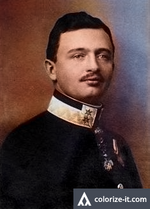
Charles I of Austria (IV of Hungary) (17 August 1887-1 April 1922) was the Emperor of Austria, King of Hungary and Croatia, and King of Bohemia from 21 November 1916 to 3 April 1919, succeeding Franz Joseph I of Austria. Charles was the last ruler of Austria-Hungary, and he died in exile on the Atlantic island of Madeira on 1 April 1922 after his nation's defeat in World War I and the end of the monarchy.
Biography[]
Charles was born on 17 August 1887 in Persenburg-Gottsdorf, Austria-Hungary, the son of Franz Joseph I of Austria's nephew Archduke Otto of Austria and Maria Josepha of Saxony. From 1906 to 1908, Charles was stationed in Prague as a soldier in the Austro-Hungarian Army, and he studied law and political science while he was there. In 1911, he married Zita of Bourbon-Parma, and Charles became the heir presumptive to the Austrian throne after the assassination of Archduke Franz Ferdinand of Austria on 28 June 1914. Charles led the XX Corps on the Italian front of World War I in 1916 before leading an army against the Russian Empire and Romania on the Eastern Front; in November 1916, he succeeded his grand-uncle Franz Joseph as Emperor of Austria-Hungary on his death.
Charles was a pacifist, and he constantly sought to make peace with the Triple Entente during the war. In April 1918, he made peace overtures to France on behalf of Austria-Hungary, although the German Empire refused to back down. In October 1918, Czechoslovakia and Yugoslavia declared independence from Austria-Hungary, which began to disintegrate as the war came to a close. On 31 October 1918, Hungary ended its personal union with Austria, and he relinquished his participation in state affairs on 11 November 1918. Charles would be exiled from Europe after twice attempting to retake the throne of Hungary, which was caught in a political crisis due to the rise of Bela Kun's communist government, and Charles was exiled to the island of Madeira in Portugal. He died of pneumonia there in 1922 at the age of 34.
